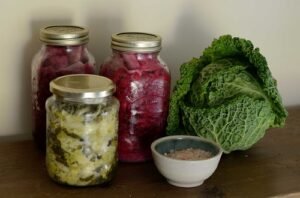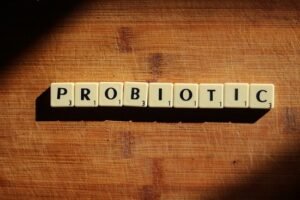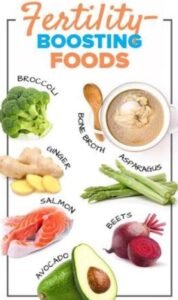Digestive enzymes, probiotics and fertility- how are these connected?
Why do I want to upgrade a fertility diet that has done such amazing things for my body so far – like shorten my menstrual cycles, increase my energy, eliminate my acne and regulate my digestive system?
Because it seems like there’s still a piece of the puzzle missing.
Something is Not Quite Right
My cycles are still too long (at 36 days), I have a few days of spotting before my period each month, my luteal phase is short (at around 10 days), I still have an occasional bout of fatigue, and my hands and feet are extremely dry and cracked.
And for the last, more information than you wanted, observation: my stool sometimes looks very undigested. Why am I not totally digesting my food? It’s normal to see certain food in your stool, like corn (which is a good way to test the transient time of your digestive tract), but I can see all kinds of veggies. OK, I’ll stop with the ‘too much information’.
But How can I Improve My Digestion?
I turned to the books on my shelf that harbor a wealth of information. Expecting to be immersed in them for weeks to find out how to improve my digestion, I spotted a new book that I’ve been meaning to crack open for weeks: Diets for Healthy Healing.
With only a half-hour before I planned on heading to bed, I thought I’d just flip through the chapters to get a start on what the topics were. An hour-and-a-half later, I was still glued to the book.
I love when a crystal clear picture emerges.
It hit me that two of the five things the author recommended for improving digestion were missing from my diet: probiotic bacteria and digestive enzymes.
Digestive Enzymes, Probiotics and Fertility
Probiotic Bacteria
 Probiotic bacteria are the friendly bacteria that live in our digestive systems. They are vital to our health and well being and are responsible for breaking down our food, manufacturing many vitamins like the B-complex vitamins and producing antibiotics that prevent colonization of the harmful bacteria.
Probiotic bacteria are the friendly bacteria that live in our digestive systems. They are vital to our health and well being and are responsible for breaking down our food, manufacturing many vitamins like the B-complex vitamins and producing antibiotics that prevent colonization of the harmful bacteria.
And it’s no stretch of the imagination to think that probiotic bacteria could affect our fertility: indirectly through proper digestion and directly since these bacteria break down and rebuild hormones such as estrogen.
Digestive Enzymes
Digestive enzymes are also critically important to our bodies. They’re found throughout our digestive system and are responsible for breaking down food to make the nutrients available to our bodies.
Our bodies produce digestive enzymes, however, enzymes are also found in certain foods.
Without enzymes our bodies can become depleted and we suffer from gas, indigestion, bloating, discomfort, undigested food in our stools, undigested fat in our stools and food sensitivities.
What Do the Experts Say About Enzymes, Probiotics and Fertility?
The funny thing is that probiotic bacteria and digestive enzymes aren’t new to me. I’ve come across them before as an essential part of a healing diet.
Clinical Nutritionalist, Elizabeth Lipski, emphasizes the importance of both in her book, Digestive Wellness; Jordan Rubin presents both as vital components to his amazing recovering from Crohn’s Disease in his book, The Maker’s Diet; and naturopath Linda Page has been using them successfully with her patients and presents this in her book, Diets for Healthy Healing.
The thing is though, neither probiotics nor enzymes are highlighted as important components to a healthy diet in scientifically based nutritional books, like Eat, Drink and Be Healthy from Harvard Medical School researcher, Dr. Walter Willett.
This is why I never added them. The hard science is still outstanding.
But the reality of nutrition is that we do not understand everything – not even close.
Dr. Willett even says in the book, Eat, Drink and Be Healthy, “It will be decades before we have identified all of the complex compounds in food and even longer before we truly understand how they interact with one another and what they do in our bodies”.
Taking Action
So, I’ve decided not to wait a few decades before I upgrade my fertility diet to include foods in my diet with probiotic bacteria and digestive enzymes. There’s enough evidence and – interestingly – fermented foods, which contain probiotics and enzymes, have long been recognized as an integral part of a healthy diet, like Miso in Japan, Lassi drinks in India, Kimchi in Asia and sauerkraut in Europe.
Most importantly, I’ve come across nothing to say that adding probiotics and enzymes in their natural form can in any way be harmful (nor did I find anything about them being harmful in supplemental form – but I’m going to start al natural).
The bottom line is that I’m interested in healing myself… and as the saying goes, “The one who heals, is the one who’s right”.
Digestive Enzymes, Probiotics and Fertility Conclusion
In my upcoming blogs you’ll find me writing about which foods naturally contain probiotic bacteria and digestive enzymes, what exactly they do in the body, and how I’ll be adding them to my diet. I’ll also be writing about the effect this diet upgrade is (or is not having) on my system. Let’s see what happens…



 It’s not a surprise that these little inhibitors are so important to us given the slew of responsibilities they have. Just to name a few of these responsibilities of probiotic bacteria:
It’s not a surprise that these little inhibitors are so important to us given the slew of responsibilities they have. Just to name a few of these responsibilities of probiotic bacteria:
 A Danish study
A Danish study Foods that Contain Prebiotics
Foods that Contain Prebiotics